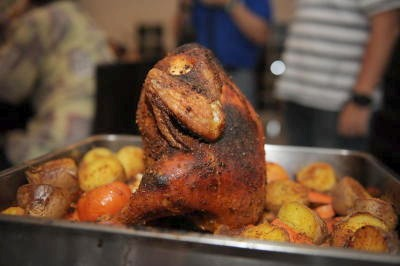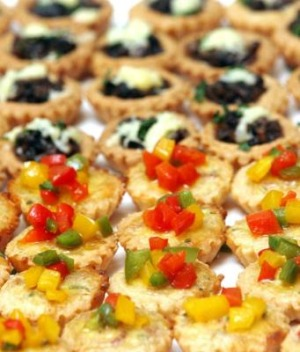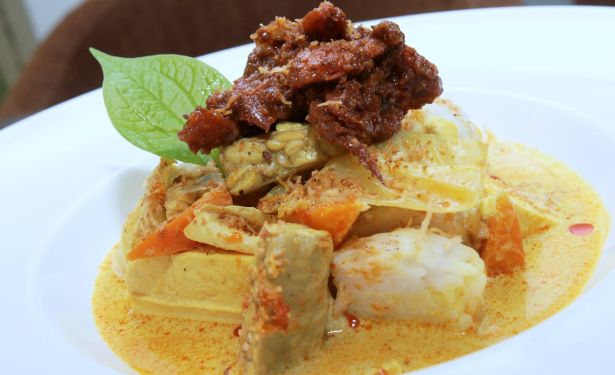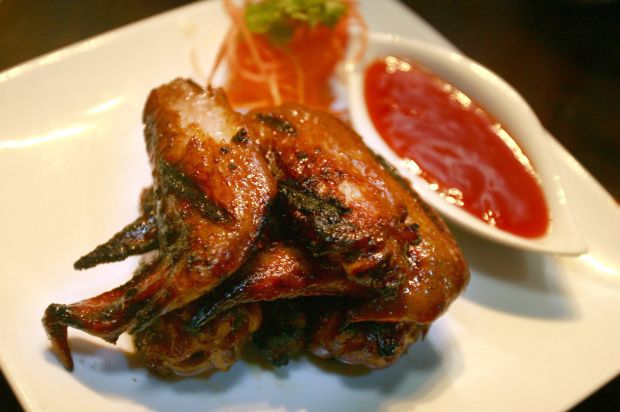Here’s one dining scene with a difference.
IN the quiet neighbourhood of Taman Tun Dr Ismail, Kuala Lumpur, an electric gate swings open to uncover the mossy driveway of a quaint double-storey house. A lush garden glows faintly beneath the moonlight; beyond that, glass panelled doors mark the entrance.
Inside, a cat sashays across the marbled floors as a voice calls out: “Welcome! Please, make yourself feel at home.” Jennifer Brand Palencia, a self-taught chef, pops out from the kitchen. We have never met – essentially, she has invited a group of strangers into her home.
In fact, her home is one of the few underground supper clubs that have recently emerged in Malaysia. Despite what the name suggests, these aren’t places that cater to midnight calls for wok-hot char kuey teow or grease-slicked chicken wings. These are dining scenes carried out at an undisclosed location advertised via word-of-mouth, e-mail or Facebook.
To find such spots, you may just have to summon your inner Sherlock Holmes. More often than not, guests will find themselves in the comforts of a chef’s abode, tucking into a wild mushroom confit, roasted rack of lamb or crème brûlée. BBC News has described this concept as “private homes opened to the public by keen amateur chefs.”
In the Palencia residence is a country-style living room bedecked with floral lamps and curtains to match. In one corner is a lazy chair turned towards a TV set, while smiling faces stare back in family photos on the walls.
The aroma of home-cooked food wafts through the air. In the dining area is a candlelit table for six, and this is where Palencia serves tangy salsa bruschetta, oven-hot broccoli and cauliflower gratin and mille-feuille with pistachio praline vanilla pastry cream – all freshly concocted in her modest kitchen.
Palencia’s daughter, local jazz crooner Mia Palencia, had chanced upon the underground scene one year ago while studying in Melbourne, Australia.
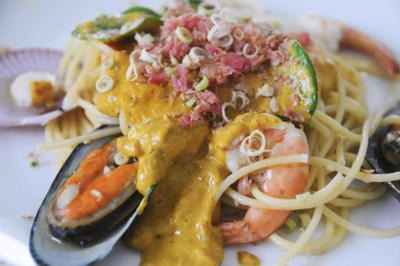 For RM88, guests at Huck’s Cafe get to enjoy a four- to five course meal consisting of dishes you may not normally encounter, like a seafood spaghetti named Ocean Deep,and Beer Butt (below), a cumin and black pepper infused chicken,roasted standing with a can of beer in place of its innards.
For RM88, guests at Huck’s Cafe get to enjoy a four- to five course meal consisting of dishes you may not normally encounter, like a seafood spaghetti named Ocean Deep,and Beer Butt (below), a cumin and black pepper infused chicken,roasted standing with a can of beer in place of its innards.“When Mia first told me about the concept, I thought it was a really great alternative – I could have my own place without being tied down to a restaurant or café. It was also something that I could do in my own time,” says Palencia, 50.
While the underground movement is relatively new here, the idea hit the international media spotlight in 2008 when Los Angeles Times journalist Jenn Garbee exposed the lot in a book entitled Secret Suppers: Rogue Chefs & Underground Restaurants in Warehouses, Townhouses, Open Fields & Everywhere In Between. At that time, Garbee estimated the existence of at least 100 such places in the United States alone. If you do a Google search, you’ll discover thousands of these set-ups, sometimes known as “anti-restaurants”, spread out across the globe.
In his Word Of Mouth Blog entry for the Guardian, American chef and sommelier Dan Perlman likens the concept of supper clubs to locked-door restaurants, which he believes have been in Argentina for the last three decades. In his personal blog saltshaker.net are links to underground set-ups found worldwide, from Canada and South Africa to Hong Kong and Singapore. Far from being a free-for-all, supper clubs require guests to come with an invitation or referral.
When Palencia’s supper club opened its doors in May, only a handful knew of its existence – but that was fine by her.
“The difference between my place and a restaurant is that I don’t have to wait for somebody to walk in. I don’t have to do any aggressive marketing. I get to enjoy what I do and keep it as a hobby. Restaurants are all out to make a profit. My purpose is to perfect something, and if I do it well, then I’ll make a profit,” says the mother of four, who runs a cooking academy for children and adults, and is currently writing a recipe book that features her young apprentices.
While “Jen’s Underground Supper Club” appears as an open page on Facebook, its exact location is revealed only to confirmed guests. This is a rule heavily practised overseas, since most of these make-shift diners operate without a licence to serve the public. Some chefs even go by quirky monikers (like Ms Marmite Lover who serves out of her home kitchen in London) to keep their identities under wraps. When it comes to health and safety issues, the supper club concept is really about eating at your own risk.
In the United States, guests of underground outfit Ghetto Gourmet (theghet.com) secure their reservations online via PayPal. An e-mail detailing the dining location will be sent no earlier than the night before the event. Strangers will congregate at a stranger’s home, if only to feast on whatever the chef has whipped up for the night.
In an interview with USA Today, Garbee refers to supper clubs as a “paid dinner party”, adding that it’s like “going to a restaurant where you don’t know who’s sitting next to you.” The price for such dinner parties ranges from US$40 to US$180 (RM128 to RM576).
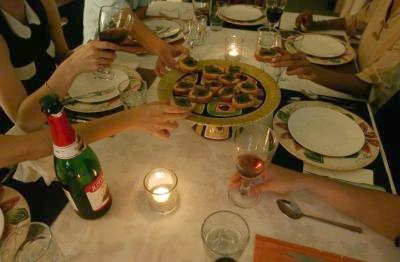 More often than not, guests of underground supper clubs will find themselves in the comforts of a chef’s abode. Overseas, places like these are great for social networking. In Malaysia, however, the events are a private affair.
More often than not, guests of underground supper clubs will find themselves in the comforts of a chef’s abode. Overseas, places like these are great for social networking. In Malaysia, however, the events are a private affair.In Malaysia, things are done a little differently. Each event is a private affair, rather than a social stratosphere for strangers.
“I’m also open to customising my menu to the needs of the guests. I’ll usually ask: What’s your favourite food? Or: What is it that you don’t eat?” says Palencia, who only serves groups of 10 and beyond. For a six to eight-course meal, the tab starts from RM150 per person.
“My food usually takes two days to prepare. And I make desserts that you don’t get outside,” Palencia adds, revealing a designer apple pie fashioned like the insides of a rose. Indeed, apart from its relaxed setting, supper clubs are widely known for serving quality food that isn’t readily available elsewhere.
Private kitchens
Instead of calling themselves underground supper clubs, some secret spots in Malaysia have termed themselves “private kitchens”. One such outfit is run by P.T., who does not want to reveal her name. Having spent some time in Italy with her husband, P.T., a home-maker in her 50s, has been serving authentic Italian food out of her home kitchen in Kuala Lumpur for over a year now.
“One day, I just had the urge to do something different. We used to invite a lot of friends to come to our house for Italian food, and they would all be so excited beforehand. Since my husband enjoys cooking, I thought: Why not give it a go?” P.T. recalls.
“We wanted to share what we knew about the Italian culture and cuisine with the people here, but we did not want to take a risk. So this works perfectly for us. It is not our wish to commercialise our business,” she adds.
Apart from the challenge of not having enough stoves to cook two different dishes at once, P.T. has to deal with the “deed of the dishes”. “I don’t have a dish washer so I have to wash everything myself,” she says.
To enjoy a four-course meal in her home, guests pay between RM100 and RM130. P.T. only takes referrals, and the maximum number of guests is 10. “Based on the Italian concept, we only serve one table. If a table can only seat six, that’s how many guests we’ll take. The Chinese always say: Never mind-lah, we can squeeze a little bit. But for Italians, they’ll make sure that their guests are always seated comfortably,” she explains.
Where Italian eateries serve spaghetti and lasagna to a fault, P.T. offers domestic dishes like asparagi con le uova, or asparagus with eggs.
“In Italian restaurants, you don’t often see stew, but that is possible in a home kitchen because you get to plan in advance,” she says.
“My guests have used the phrase, ‘It is an experience’, to describe my place. I still find it surprising to see them so relaxed in my home – hanging around my living room and out in the balcony. I guess it’s not the same as going to a restaurant and sitting at the table. They do feel the exclusiveness,” she adds. Thankfully, she has had no problems with rowdy guests.
At Huck’s Café, another private kitchen in Bangsar, Kuala Lumpur, home-grown chef Poh Huck Seng, 47, calls his guests, “friends”. “Everyone is really nice. Some of them have even returned 12 times!” he says.
The former advertising creative director had always wanted a café. “My children love Western food. I only started cooking to impress them. When Facebook came about, I took pictures of all my creations and posted them in a photo album which I had named Huck’s Café,” Poh recalls.
Soon after, people started enquiring about the “make-believe” café. “Some asked about the location of the café, while others wanted to know how much each dish costs. One day, I posted an apology on my Facebook wall, and told everyone that the café wasn’t real,” says the father of three.
“That’s when my niece, who was staying in Sweden at that time, told me about the underground dining scene there and how they were becoming popular tourist spots. I thought the concept was really fun,” he adds.
The real Huck’s Café materialised in August last year, operating out of Poh’s home in Jalan Gasing, Selangor. Unlike P.T.’s place, whose neighbours suspect nothing, Poh had to fend off complaints for his unlicensed outfit. After a visit by the Petaling Jaya City Council, Poh decided to move his services to a more secluded location. The private kitchen can now be found in a rented single-storey bungalow with a backyard spacious enough for 12 cars.
The house itself is designed to accommodate as many as five groups of diners at any one time, but Poh’s limit is 35 guests in one night. For RM88, guests get to enjoy a four- to five-course meal consisting of dishes you may not normally encounter, like a “beer butt” (cumin and black pepper-infused chicken, roasted standing with a can of beer in place of its innards), durian mud pie and a Malaysianised sambal belacan seafood spaghetti called Ocean Deep.
“In the beginning, I wanted to incorporate the underground concept of dining with strangers, but it seems that Malaysians prefer their privacy. Some of my foreign guests have asked if they could come here alone. My answer is always no. They should come in pairs at least. Or else, who is going to entertain them?” Poh says.
To be on his guestlist, the wait is at times three weeks long. After all, Huck’s Café has garnered over 5,000 likes on its Facebook page. While this may mean that it has lost some of the enigma associated with underground supper clubs, the private kitchen is still a cosy alternative to your everyday restaurant.
“People come here not just to eat, but to relax,” Poh opines. “They like my food, and I get to experiment with my cooking. It’s like inviting friends over to your house for a meal. The best part is, you get paid.”

